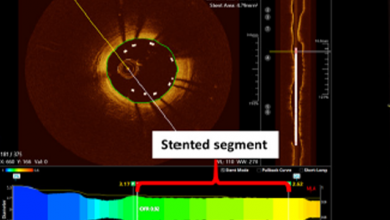Search results
Author(s):
Christina Y Aye
,
Henry Boardman
,
Paul Leeson
Added:
3 years ago
Historically pregnancy has been viewed as only clinically relevant to women and for the relatively brief time from conception to the puerperium. However it is now clear that events during pregnancy have much longer-term implications, particularly for cardiovascular health, both for the mother and her offspring.
Pregnancy complications such as hypertension and preterm birth appear to serve as a…
View more
Author(s):
Shah R Mohdnazri
,
Thomas R Keeble
,
Andrew SP Sharp
Added:
3 years ago
Fractional flow reserve (FFR) is an index used to describe the physiological significance of a coronary stenosis. It measures the pressure drop under conditions of maximal hyperaemia between the aorta and a selected vessel location distal to an angiographic lesion.1 Several FFR studies have identified patient groups in whom coronary stenting is associated with improved outcomes when compared with…
View more
Author(s):
Mohammed Shahidul Hoque
,
Chaudhury Meshkat Ahmed
,
Din-E-Mujahid Mohammad Faruque Osmany
,
et al
Added:
8 months ago
Author(s):
Jelmer Westra
,
Shengxian Tu
Added:
3 years ago
Physiological lesion assessment is recommended for the identification of intermediate coronary lesions that might benefit from percutaneous coronary intervention (PCI).1 The quantitative flow ratio (QFR) was developed to derive coronary physiology from angiographic images, whereas the optical flow ratio (OFR) is a more recent approach for the rapid and automated assessment of coronary physiology…
View more
Author(s):
Milton Packer
Added:
3 years ago
Patients with a broad range of systemic inflammatory rheumatic diseases (i.e. rheumatoid arthritis, systemic lupus erythematosus, psoriatic arthritis and ankylosing spondylitis) are exceptionally prone to cardiovascular disorders, but previous work concerning the development of heart disease in these individuals has largely focused on the risk of MI.
However, the most important cardiovascular…
View more
Author(s):
Carrie Eshelbrenner
,
Karina Vasquez
,
Liberty O Yanze
,
et al
Added:
3 years ago
Cardiologists in general are strong advocates of evidence-based medicine, due to the critical nature of ischemic heart disease in patients. The use of up-to-date scientific evidence from research is paramount as the basis for making many medical decisions. There are three major advantages to using this approach. First, it offers some of the most objective ways to determine and maintain consistent…
View more
Author(s):
David SH Bell
Added:
3 years ago
Thiazolidinediones (TZD) and metformin lower cardiac risk factors, as do serum glucoses, and are therefore the best choice for initial therapy of type 2 diabetes. To choose between metformin and a thiazolidinedione is difficult because of the many benefits of both drugs. In most cases, a combination of metformin and a TZD is chosen, and this article describes the rationale for this decision.
The…
View more
Author(s):
Sophie Mavrogeni
,
George Markousis-Mavrogenis
,
Genovefa Kolovou
Added:
3 years ago
Systemic means ‘pertaining to or affecting the whole body’ as opposed to a localised condition. A systemic disease is one that affects a number of organs and tissues, or the body as a whole. Systemic diseases, according to WHO classification,1 and cardiac diseases that developed during their course, are listed in Table 1.
Download original
Thyroid diseases, pheochromocytoma and growth hormone…
View more
Author(s):
Sabina Frljak
,
Gregor Poglajen
,
Bojan Vrtovec
Added:
2 years ago
Author(s):
Serban Balanescu
Added:
3 years ago
Coronary artery disease (CAD) due to atherosclerosis is a major cause of morbidity and mortality. Early prevention of atherothrombotic disease with a healthy lifestyle (diet, exercise, optimal body weight and no smoking) is considered the best method of “treating” CAD, although increasing age remains associated with significant cardiovascular events.
When coronary atherothrombotic disease…
View more












 « First
« First